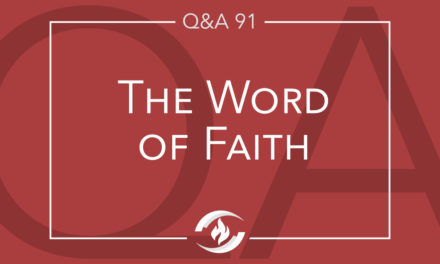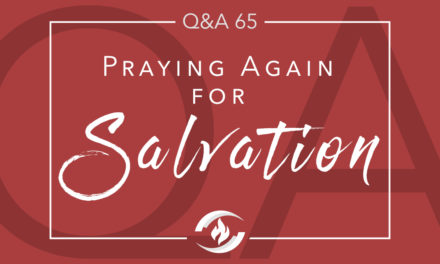Q.
When presenting the Gospel, should the presenter say to the unbeliever that Christ died for them?
Kind Regards,
Mike
A.
Hello Mike,
Thanks for your question. I’m assuming your question relates to whether Jesus Christ died for every individual or just the elect. Let’s let the words of God answer the question.
Hebrews 2:9 states, “But we see Jesus, who was made a little lower than the angels for the suffering of death, crowned with glory and honour; that he by the grace of God should taste death for every man.” Jesus tasted death, He died, for every one.
First John 2:2 says, “And he is the propitiation for our sins: and not for ours only, but also for the sins of the whole world.” Propitiation took place at the cross where God’s wrath was satisfied by Christ dying for the “sins of the whole world.” The phrase the whole world includes everyone in the world.
Second Peter 2:1 clarifies, “But there were false prophets also among the people, even as there shall be false teachers among you, who privily shall bring in damnable heresies, even denying the Lord that bought them, and bring upon themselves swift destruction.” The Lord that bought them references the cross where redemption took place when Jesus died even for those who reject Him. This verse reveals the truth with absolute clarity that Christ died for all, for every individual.
Jesus died for every sinner. Therefore, in every instance of witnessing to the lost, we can rightly declare Jesus died for them.
John
We’d love to hear your thoughts on this subject in the comments section below! If you have a question on another subject, we welcome you to make a submission by clicking here:











Amen! I’m so glad that “God so loved the world that He gave…” Jesus to die “…for the sins of the whole world.” “…that whosoever believeth in Him should not perish, but have everlasting life.”
Two arguments speak to the contrary, I believe. (Bible quotations here are from ESV.) First, the Bible says Christ “loved the church and gave himself up for her” as if for his bride (Eph. 5:25), also implicitly that he laid down his life for his friends (John 15:12-14), and that he laid down his life “for the sheep” (John 10:11, 15). Each of these figures is an image of special love toward someone or something—a husband to his own wife, a man to his own friends, and a shepherd to his own sheep—and that the sacrifice is made because of… Read more »
Thanks for your comment. I suppose I will just agree to disagree.
One clarification: God does call all people to repent and to believe that Jesus has saved them from their sins through his death and resurrection. All who repent and believe are saved. People sometimes mischaracterize the doctrine I’ve explained as saying that some people who seek salvation in Christ will be turned away because he did not die for them, but that is horribly false. All who repent and believe are saved. But Jesus did not die for those who never repent and believe.
I suppose that an inheritance left to me is for me but if I do not claim it, then it never becomes mine in reality. So Christ’s death is sufficient and of infinite worth but only efficient conditioned on the faith of individuals.
Well said! In addition a few thoughts come to mind:
First, the passages regarding the “church” fit within the passages regarding Christ death for “all.” But if they mean only the church, then they violate the passages that plainly say “all.” Scripture cannot contradict Scripture.
Second, lengthy commentary should not be necessary to show the plain sense of clear passages. Salvation passages are not difficult.
Third, if one really believes Christ only died for the elect, it undermines faith for witnessing, and turns witnessing into ritualistic duty.
On your first point, would you please explain how the passages about the church fit within the passages about Christ’s death for all—do you mean simply that if Christ died for all, then he also died for the church? Because that would overlook the main point I was trying to make—that the former passages all teach that there is a special relationship of love between Christ and his church based on which he made his sacrifice; see how much he loves the church! If that was the reason for his sacrifice for the church, then why, in your view, did… Read more »
Finishing up my response: Even if my arguments were lengthy, you have not shown where my reasoning is in error. I could have made them briefer, but it seemed better to try to anticipate and handle a few common objections. I was disappointed that you did not take advantage of that and offered an objection I had already addressed. Salvation passages are not difficult—I am confident that we agree on how to be saved in Jesus Christ—but these passages and our disagreement are about the extent of the atonement, which is a more detailed thing. As for your third point,… Read more »
Thank you for your response. I had to take some time to understand the relationship between your response and my post–sorry for the delay–so having done that: Regarding your second sentence, I agree that Christ’s death is sufficient for all and of infinite worth; I would say it is only efficient for those whom he has chosen, and these are the same people who have faith in Christ. Regarding your first sentence, I think you are trying to help me grasp how some people are saved and some are not, even if (as in your view) Jesus died for everyone.… Read more »
John 3:16 – “God so loved the world.” Jesus said this and meant it as He said it. I certainly don’t mean to be unkind, but it seems to me only a preconceived notion could read this as “God so loved the elect” or “God so loved the church.” This presupposition changes the meaning found in the word choice of Jesus. The provision of God’s love includes the world so that “whosoever” can benefit from God giving His Son. Obviously, only those who “believe in Him” benefit. But anyone (“whosoever”) may. This does not negate God’s special love for the… Read more »
My sense of this argument is that I arguing from some passage A and concluding limited atonement, and then you are arguing from another passage B and concluding universal atonement, and then you go on to conclude that I am therefore wrong and engaging in eisegesis. But arguing doesn’t work that way. To refute my position you do need to present your position from the passages of your choice, but you also need to show how my interpretation of passage A is faulty by providing a reasonable alternative interpretation of the same passage. To say I am eisegeting, you need… Read more »
This is my last post for this thread. The thread started with a simple question and simple answer. The passages you brought up have been addressed. That God loves the church does not diminish His love for the world. The passages about God’s love for the church do not “limit” the passages about God’s love for the world. God is not willing that any should perish, but that all should come to repentance (2 Pet. 3:9). God “will have all men to be saved” (1 Tim. 2:3). It is God’s will that all men get saved. The text says so.… Read more »
I’m sorry, I see I was not communicating well in my previous post and may have even confused myself in part. I respect your decision to stop posting on this thread, so I will merely raise issues without expecting a reply. The passage I brought up in my first post that I think you did not address was 2 Cor. 5:14. I argued that the passage teaches the principle that if Christ died for anyone, then that person has also “died” as a result (“one has died for all, therefore all have died”). For Christians this resulting death refers to… Read more »